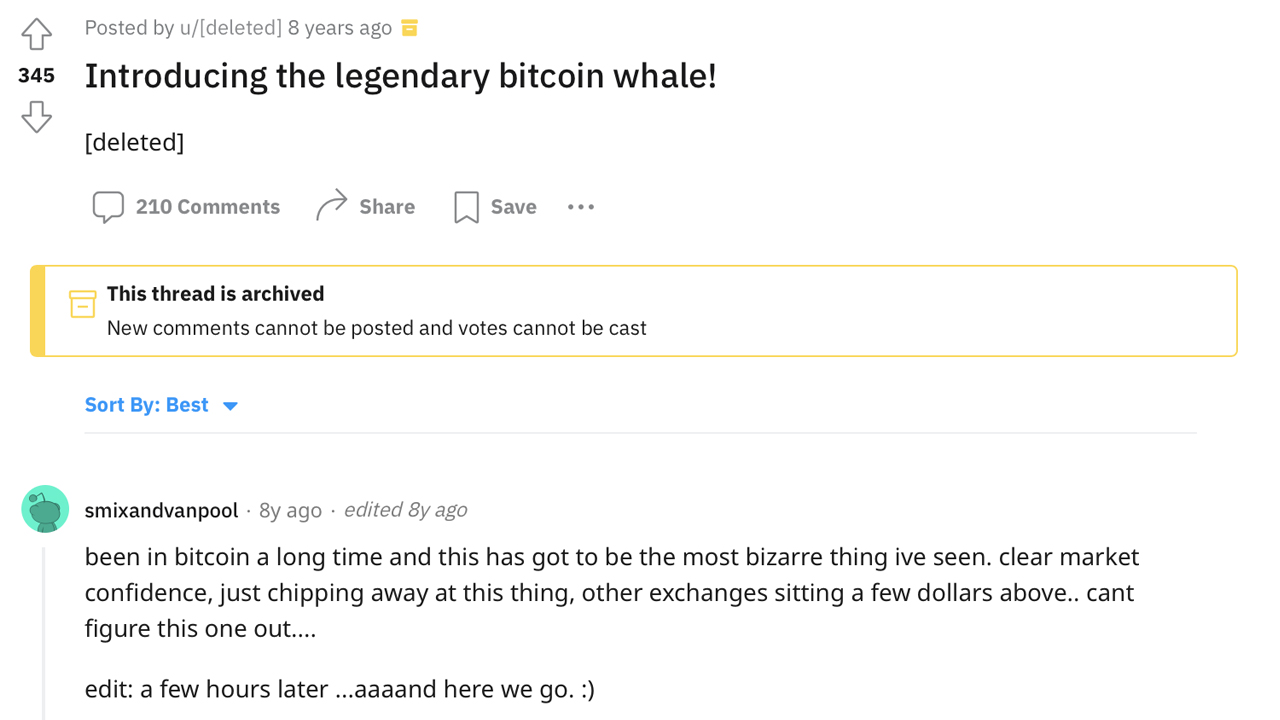8 Years Ago Today: Bitcoin Traders Slayed the Infamous Bear Whale Who Dumped 30,000 BTC in a Single Trade

Eight years ago today on October 6, 2014, while the price of bitcoin was coasting along at $330 per unit, an anonymous Bitstamp trader placed an order to sell 30,000 bitcoins. Moreover, the trader, now infamously known as the “Bear Whale,” sold the coins at $300 per unit, which put extreme pressure on the nascent bitcoin market that saw roughly $29 million a day in global trade volume.
A Look at the October 2014 Bitcoin ‘Bear Whale Incident’
While bitcoin (BTC) is trading for just below the $20K region, approximately eight years ago today, bitcoin traders faced off with the notorious “Bear Whale.” It was October 6, 2014, when the anonymous trader decided to sell 30,000 BTC in a single trade for $300 per coin.
At the time, the trader was looking to obtain $9 million from the sale and today, those bitcoins are worth roughly $603 million. When the event took place, the crypto community went wild and it even caught the attention of mainstream media outlets. The price of bitcoin just before Bear Whale’s infamous dump was around $330 and the trader’s $300 monstrous sell wall was eaten up by market traders that day.

Five years ago, Bear Whale allegedly posted to Reddit claiming it was his address that sold the coins, and he further said he acquired the bitcoins at $8 per unit. He also noted that he hastily put up the 30,000 BTC trade that day because he wanted to get away from his desktop.
“I could have gotten a better price if I spent more time working the order I guess,” Bear Whale said to the r/bitcoin Reddit community at the time. “I put up the wall because I didn’t want to just sit in front of the computer all day,” Bear Whale added.
Almost immediately after the anonymous Bitstamp trader made the sale, the crypto community named the seller Bear Whale, and they created memes around the notorious bitcoin seller. The name Bear Whale paid homage to the infamous London Whale, a JPMorgan Chase trader that lost $6.2 billion from erroneous trades. Bitcoiners mythologized the incident by saying that the community “slayed” the formidable beast on October 6, 2014.
“I feel like singing that whale meat song,” one bitcoiner said after the sell wall was defeated. “Haha, so the whale lost almost a million bucks by selling it all at 300 instead of piecing it out and selling around 325,” another person from r/bitcoin wrote.
While the community thought it was a crazy battle of market forces, Bear Whale mentioned in his Reddit post that he simply lost faith in the leading digital currency at the time. Reportedly, Bear Whale’s reason to come out with his identity because of the scaling debate, and later he decided to go “all-in on bitcoin again,” while bitcoin (BTC) was trading at just above 1,000 nominal U.S. dollars per coin.

The lesson that can be learned from Bear Whale’s story is that it’s quite possible a large whale could lose faith in BTC again, or at the right price range may want to dump billions of dollars worth of bitcoin. However, markets are a lot more robust than they were in 2014, when the average daily volume was around $29 million per day.
Presently, BTC’s 24-hour global trade volume is around $32.63 billion at the time of writing which is 112,425% larger in size compared to 2014’s daily BTC trade volume. At the time eight years ago, the managing director of Secondmarket Brendan O’Connor told CNBC that the move was a “very ‘immaturish’ way to liquidate that amount of coin.”
O’Connor further stressed that it ruined his Sunday. “I have to tell you, it doesn’t make any sense at all from a trading standpoint. It’s the last way in the world you would actually want to liquidate a large position like that,” O’Connor told the news reporter on October 9, 2014.
What do you think about the Bear Whale story that took place on this day in 2014? Let us know what you think about this subject in the comments section below.
Comments
Post a Comment